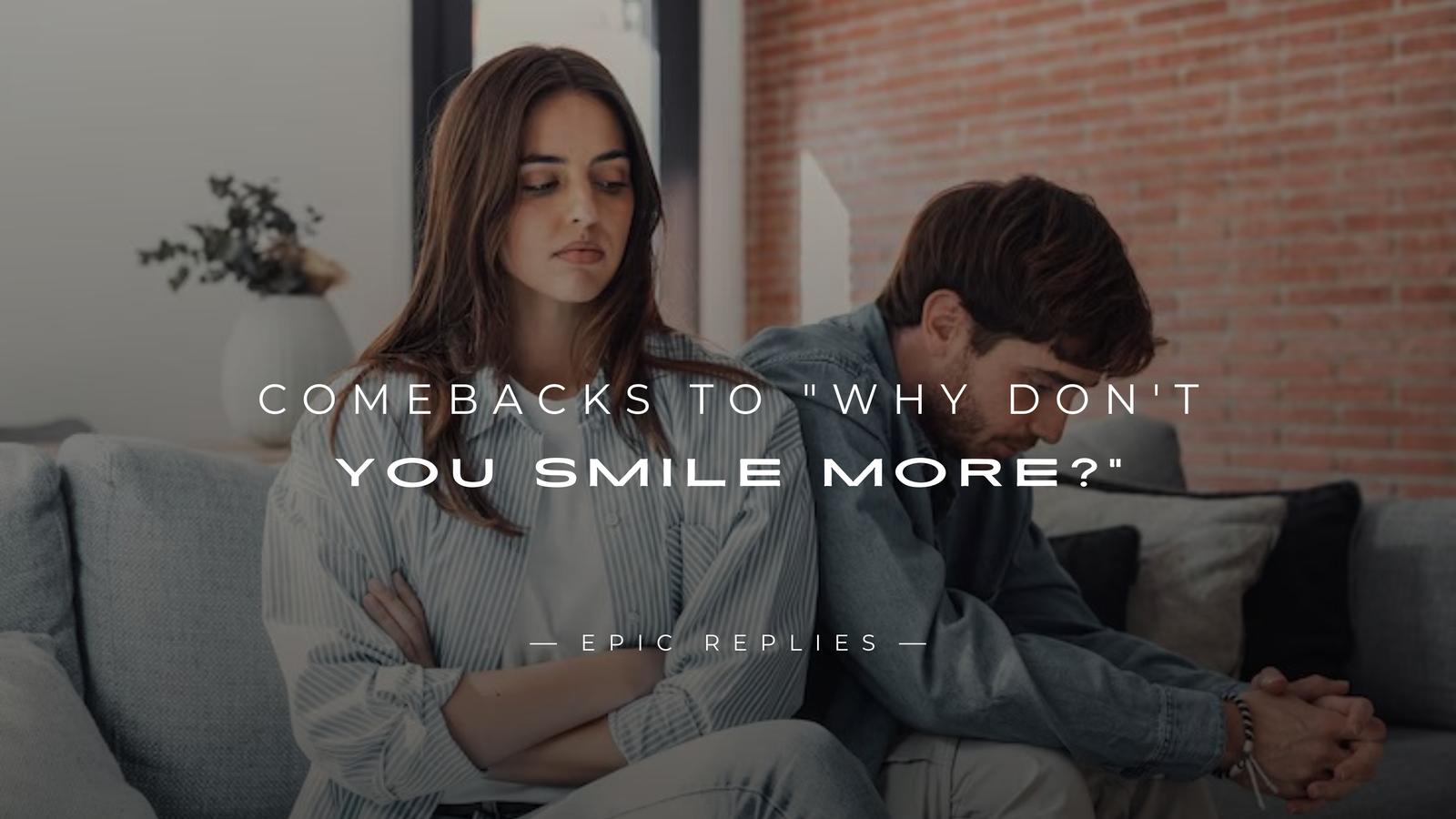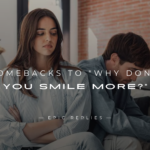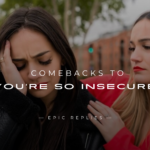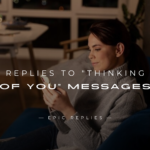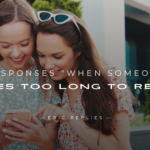Have you ever been walking down the street, sitting at work, or simply lost in your thoughts when someone suddenly says, “Why don’t you smile more?” It might sound innocent or friendly, but for many people, that question feels uncomfortable or even disrespectful. It can come across as a demand rather than a suggestion, and it often implies that your natural expression is not good enough.
The phrase “Why Don’t You Smile More?” is one of those comments that reveal how people sometimes feel entitled to control or judge others’ emotions and appearances. It may seem harmless, but underneath it lies an assumption that you owe the world your cheerfulness. This article will explore what this phrase really means, why it can be problematic, and most importantly, how you can respond to it confidently and assertively.
You will learn different types of comebacks, practical examples for different situations, and tips for handling such remarks while maintaining your peace of mind. Let’s dive deep into the psychology, social meaning, and powerful responses behind “Why Don’t You Smile More?”
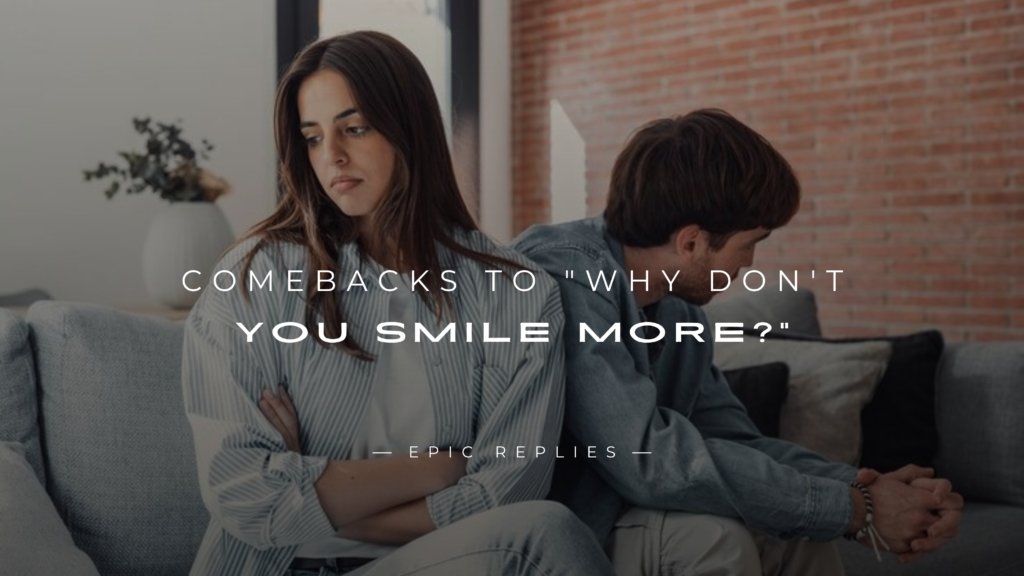
250+ Comebacks to “Why Don’t You Smile More?”
Savage & Sharp
- Maybe because I’m too busy minding my own business.
- Smiling isn’t a customer service requirement today.
- I’ll smile when you say something worth smiling about.
- My face doesn’t take requests.
- Did I accidentally apply to be your entertainer?
- I save my smiles for people who deserve them.
- You first, let me see how it’s done.
- Oh, you think I exist for your visual pleasure? Cute.
- I’m not sad, I’m just allergic to nonsense.
- The day you stop commenting on my face, maybe I will.
Flirty & Playful
- Maybe I’m saving my smile for someone special.
- You want one that bad? Earn it.
- Depends… are you trying to make me?
- I could, but then you might fall in love.
- Careful, my smile’s got side effects.
- Keep talking, maybe I’ll find a reason.
- Oh, so you noticed my resting mystery face.
- Buy me coffee first, then we’ll see.
- Maybe I’m smiling on the inside, you just can’t handle subtlety.
- I’ll smile if you promise not to get addicted.
Cool & Unbothered
- I’m fine, just not performing emotions right now.
- I smile when I feel like it, not on command.
- Didn’t realize there was a smile quota today.
- My vibe doesn’t require constant grinning.
- I like to keep people guessing.
- That’s just my neutral setting.
- I’m relaxed, not miserable.
- Some days I prefer minimal expression.
- I’m good, just not auditioning for toothpaste ads.
- Thanks for your concern, but I’m good as is.
Funny & Sarcastic
- Oh no, is my face broken again?
- Hold on, let me reboot my smile software.
- Because smiling burns calories, and I’m lazy.
- I did earlier, you must’ve missed the limited edition.
- I’m saving my smile for the sequel.
- I used up my smiles on the last annoying comment.
- It’s in the shop for repairs, should be back Tuesday.
- I’m smiling internally, can’t you tell?
- My smile subscription expired.
- Sorry, corporate said no more free smiles.
Witty & Clever
- Oh, I charge per grin now, inflation hit everyone.
- You know, unsolicited feedback is still unsolicited.
- If I smiled more, I’d ruin my mysterious brand.
- You must be confusing me with your personal happiness manager.
- Smiles are like investments, I choose wisely.
- My face isn’t open for public edits.
- I’m just keeping my serotonin under NDA.
- The smile economy’s down this quarter.
- You should start a campaign for “mandatory smiling.”
- My resting face passed quality control just fine.
Dry & Deadpan
- Because I’m not smiling.
- It’s optional.
- Not feeling it.
- My muscles are on break.
- Maybe later.
- I’ll get back to you on that.
- Is there a rulebook for this?
- Smiling’s overrated.
- Thanks for your observation.
- Duly noted.
Sassy & Confident
- Honey, this face doesn’t owe anyone a smile.
- I’m the mood, not the entertainment.
- Don’t worry, I still look amazing without it.
- Smiling won’t make me prettier, I already am.
- If I smiled any more, I’d charge rent for the joy.
- You can’t handle the full power of my smile anyway.
- Oh, sweetie, my resting face slays.
- I’m not frowning, I’m just flawless.
- My confidence doesn’t need constant grinning.
- I smile on my own terms, darling.
Empowered Feminist
- My face isn’t here to make others comfortable.
- Women don’t owe anyone a smile.
- Asking that question says more about you than me.
- I’m not an accessory, I’m a person.
- I’ll smile when I feel respected, not instructed.
- That’s a classic example of policing women’s behavior.
- You don’t get to dictate my expression.
- My worth isn’t tied to my appearance.
- I’m here to exist, not to please.
- Telling women to smile is outdated try again.
Awkward Humor
- Oh sorry, I left my smile in my other face.
- Should I do it now or would you prefer a schedule?
- I’ll smile if you rate it afterward.
- This is me smiling on the inside, promise.
- My cheeks get stage fright under pressure.
- Are we grading expressions now?
- If I smile too much, I might scare people.
- Wow, you noticed! My facial settings must’ve glitched again.
- I tried smiling once, it was weird for everyone.
- I’ll send you a smile via email, more professional that way.
Zen & Chill
- Smiles come and go like the wind.
- I’m at peace without performing it.
- I smile when the universe asks nicely.
- My calm doesn’t need decoration.
- Happiness isn’t measured in facial curvature.
- This is inner joy, it just travels slowly to the surface.
- I’m centered, not cheerful on demand.
- My serenity doesn’t need witnesses.
- I’m present, and that’s enough.
- The still face is part of the practice.
Royal Energy
- Royals don’t smile on command.
- My expression is already majestic enough.
- You address a queen, not a jester.
- I smile only at coronations and compliments.
- My resting face has royal approval.
- The crown doesn’t require constant joy.
- If I smiled more, the court might faint.
- You don’t summon smiles from royalty, you earn them.
- My presence is the gift, not my grin.
- Nobility doesn’t need validation.
Professional Mode
- I’m focused, not unfriendly.
- Smiling isn’t in the project brief.
- I’ll add that to my KPI, thanks.
- My performance metrics don’t include facial expression.
- I’m efficient, not emotionless.
- The deadline is what I’m looking at, not a mirror.
- I’m on task, not on stage.
- My professionalism speaks louder than a smile.
- I’ll smile after the meeting’s over.
- You’ll get results, not rehearsed expressions.
Overly Literal
- Because my facial muscles are currently at rest.
- You asked, I answered: I don’t feel like it.
- Gravity pulls my lips down naturally.
- My mouth isn’t in smile mode right now.
- Statistically, I spend more time not smiling.
- Smiling requires a reason, and I lack one presently.
- The neurons didn’t send that command today.
- My face doesn’t auto-refresh.
- Smiling isn’t mandatory by law.
- I’ll smile after this conversation is mathematically justified.
Robot Responses
- Error 404: Smile not found.
- Processing request. Invalid command detected.
- Smiling.exe is currently offline.
- Command denied. Insufficient motivation.
- Updating firmware for emotional output. Please wait.
- Battery low, facial expression disabled.
- I require emotional input before performing smile protocol.
- Smile command queued for future consideration.
- System override needed for manual grin.
- Unit operating normally. No smile required.
Mystical & Dramatic
- My smile appears only under a blood moon.
- The stars haven’t aligned for that yet.
- Smiling would disturb the prophecy.
- I’m saving my grin for a cosmic event.
- My joy is sealed in ancient magic.
- I smile only when destiny demands it.
- The oracle said not today.
- My expression is part of a sacred ritual of calm.
- Beware, my smile summons thunderstorms.
- My resting face guards ancient secrets.
Quietly Menacing
- Maybe I’m just waiting for the right moment.
- I’ll smile when I’m done plotting.
- You wouldn’t want to know what comes after the smile.
- I was, but then you spoke.
- My smile usually means trouble.
- Careful, my smiles have consequences.
- People who ask that don’t usually ask twice.
- I’m saving my smile for your evaluation report.
- The last time I smiled, someone regretted it.
- If I smile now, you might start running.
Detective Style
- Interesting observation. What made you notice?
- Hmm, do I look unhappy to you, or just unreadable?
- So you think smiling equals contentment? Fascinating.
- What leads you to believe I should be smiling?
- You seem invested in my mood. Why is that?
- Curious. Does my lack of smile inconvenience you somehow?
- Let’s examine that. You asked because…?
- You’re noticing patterns in my expression. What are you hoping to find?
- So if I smiled, would that change your perception of me?
- I think we’ve uncovered a clue about your expectations.
Reverse Uno
- Why don’t you smile more?
- I could ask you the same thing.
- You first, show me how it’s done.
- Is this a competition? You’re losing.
- Oh, are we judging facial expressions now? Yours looks tired.
- You seem pretty serious yourself.
- I didn’t see you smiling either, hypocrite.
- Why don’t you mind your own face?
- Funny, I was just thinking that about you.
- You look better when you don’t talk.
Movie Quote Inspired
- “Frankly, my dear, I don’t give a damn.”
- “Here’s looking at you, kid, still not smiling.”
- “I’m Batman. Batman doesn’t smile.”
- “You talking to me or my face?”
- “May the odds be ever in your favor… of minding your business.”
- “There’s no place like my own expression.”
- “Life finds a way, just not into my smile.”
- “I could smile, but then I’d have to kill the vibe.”
- “Why so serious?” Oh wait, wrong movie.
- “I’ll be backwith the same face.”
Millennial/Gen Z Internet Energy
- That’s crazy, but did I ask?
- Sorry, I’m in my unbothered era.
- My face is on Do Not Disturb.
- Bro, it’s giving unsolicited opinion.
- This ain’t the vibe check you think it is.
- I’m in my main character arc, not a rom-com.
- Smiling’s too mainstream, I’m niche.
- Hold on, let me subscribe to your advice channeloh wait, no.
- I’m soft-launching emotions later this week.
- Screenshotting this for the group chat.
Existential Dread
- What is a smile but a mask for the void?
- Does it matter if I do? We all fade anyway.
- I would, but the universe feels indifferent.
- Smiling won’t fix the cosmic absurdity.
- I smiled once. Time kept moving.
- I’m saving my smile for when existence makes sense.
- My grin dissolved along with meaning.
- I’m not sad, just self-aware.
- The stars aren’t smiling either.
- Because entropy doesn’t require it.
Villain Era
- Smiling is for heroes, and I’ve retired.
- I prefer smirks, they suit my reputation.
- I smile only when the plan works.
- Heroes grin. I plot.
- I’m in my era of subtle menace.
- My smile costs more than your comfort.
- The villain doesn’t owe anyone warmth.
- Smiles are weakness. I evolved.
- I’m collecting frowns; they’re worth more.
- Keep waiting. The smile is the last thing you’ll see.
Kind but Cutting
- I appreciate your concern, but I’m good as I am.
- You mean well, but that’s not really your call.
- Thanks, I’ll handle my own expressions.
- I know you’re trying to be nice, but that comment’s a bit outdated.
- My comfort matters more than appearances.
- I’m happy without proving it.
- That’s a kind thought, just not a necessary one.
- I hope one day people stop saying that to anyone.
- I like my neutral face, it’s peaceful.
- You don’t need to fix what isn’t broken.
Whimsical & Absurd
- My smile’s on vacation in the Bermuda Triangle.
- The last one escaped into a jar of stardust.
- I traded my grin for extra brain cells.
- My face ran out of smiles, check back next moon cycle.
- My pet cloud took it with him.
- I only smile when the ducks approve.
- My expression’s under construction, new features coming soon.
- Smiles cost two unicorn tears each, I’m saving up.
- My face is on airplane mode.
- The wind told me not to today.
Reflective & Honest
- Sometimes I just don’t feel like it, and that’s okay.
- Not every calm face means unhappiness.
- I smile when I genuinely feel it, not to please others.
- My neutral face doesn’t mean something’s wrong.
- I’m comfortable being real, not performative.
- I’m allowed to exist without a smile.
- It’s not a lack of joy, it’s just rest.
- I like saving my smiles for moments that deserve them.
- It’s nice to be asked, but I prefer authenticity.
- I’ll smile when it feels honest, not required.
What’s Behind “Why Don’t You Smile More?”
- The Social Conditioning Behind Smiling
From childhood, many of us are told to smile to be liked, to seem polite, and to make others feel comfortable. In many societies, smiling is treated as a sign of friendliness and approachability. However, this expectation often falls disproportionately on women, who are taught to appear pleasant and agreeable regardless of how they actually feel.
When someone asks you, “Why don’t you smile more?”, it might not be about your happiness at all. It can be about what society expects from you. The expectation that you should always look cheerful can feel exhausting, especially when it ignores your genuine emotions.
- Gender and Power in the Phrase
For decades, the phrase has been used more frequently toward women, as part of broader gendered expectations. It subtly reinforces the idea that women should be pleasing to look at and emotionally available at all times. This behavior reflects an imbalance of power, where someone feels entitled to comment on your expression or mood simply because they can.
That’s why it often feels uncomfortable it’s not just a comment about your face. It’s a comment about control.
Why “Why Don’t You Smile More?” Is Problematic
- It Treats Your Expression as Public Property
When people ask this question, they are implying that your facial expressions exist for their benefit. They want you to perform happiness for their comfort. But your face is yours. You are under no obligation to smile just because someone else wants you to.
This type of comment disregards your autonomy and your right to exist as you are. You can be deep in thought, serious, sad, or simply neutral and all those are perfectly human expressions.
- It Enforces Emotional Labor
Smiling on command can be a form of emotional labor an invisible effort that people, especially women, are often expected to perform. The idea that you must always appear pleasant and approachable is unrealistic and unfair. Constantly pretending to be cheerful can drain your emotional energy.
Being told to smile also dismisses your inner state. It implies that your authentic emotions are not valid or welcome, which can be deeply invalidating over time.
- It Can Create Uncomfortable or Unsafe Situations
When a stranger tells you to smile, it can sometimes feel invasive or even threatening. It’s especially uncomfortable when it happens in public spaces, because it blurs boundaries. It can be perceived as flirtatious, condescending, or disrespectful, depending on the context.
For some people, the phrase triggers feelings of vulnerability, because it puts them in a position where their body and emotions are being commented on without consent.
How to Respond to “Why Don’t You Smile More?”
Before choosing a comeback, consider your environment, your safety, and your comfort level. There are many types of responses you can use, depending on who is asking and how you feel in that moment.
1. Light and Humorous Comebacks
If the situation feels safe and you want to respond playfully, humor can work wonders. It allows you to reclaim control of the moment while keeping things light.
Examples:
- “I already smiled today. I’m saving the rest for later.”
- “My smile is currently out of order.”
- “Only if you can make me laugh first.”
- “Sorry, my smile’s on vacation.”
Humor defuses tension and turns the comment around. It signals that you’re not taking the remark seriously, without escalating the situation.
2. Short and Assertive Comebacks
If you want to set a firm boundary, short and direct replies work best. They leave no room for argument.
Examples:
- “I’ll smile when I feel like it.”
- “Please don’t tell me how to look.”
- “That’s not your concern.”
- “I’m fine without smiling.”
These responses are calm but confident. They send a clear message that you’re in charge of your own body and emotions.
3. Educational and Boundary-Setting Comebacks
If the person is someone you know and you think they might be open to understanding, a brief explanation can help them realize why their comment is inappropriate.
Examples:
- “Telling someone to smile can be a bit intrusive. I’d rather you didn’t.”
- “I know you probably mean well, but that comment feels uncomfortable.”
- “It’s better to ask how someone’s doing than tell them to smile.”
These responses help educate others while still protecting your personal boundaries.
4. Deflecting or Redirecting Comebacks
Sometimes it’s easier to change the subject and move on. Deflecting allows you to avoid confrontation while still keeping control of the situation.
Examples:
- “I was just thinking about something important.”
- “Anyway, how are you doing?”
- “Let’s talk about something more interesting.”
Deflection is especially useful in work environments or social gatherings where you don’t want to make things awkward.
5. Reflective Comebacks
Turning the question back on the person can make them realize how intrusive it sounds.
Examples:
- “Why does my smile matter to you?”
- “Would you say that to a man?”
- “What makes you think I should be smiling right now?”
These responses are calm, reflective, and often make the asker uncomfortable in the right way it forces them to think about why they made the comment in the first place.
Comebacks by Situation
When It’s a Stranger
If a random person says it in public, prioritize your safety. Sometimes the best response is no response at all.
Examples:
- “Have a nice day.” (and walk away)
- “Not interested.”
- Or simply keep walking without replying.
Ignoring someone is not rude when they have crossed a boundary.
When It’s a Coworker or Boss
Professional environments require tact. You can still be assertive while keeping things polite.
Examples:
- “I’d prefer if we kept our conversations work-related.”
- “That comment feels a bit personal for work.”
If it happens repeatedly, document it and report it to HR. No one should make you feel uncomfortable at work.
When It’s a Friend or Family Member
Friends and family often mean well, but their words can still sting. It’s okay to set boundaries even with people you love.
Examples:
- “I know you care, but that comment makes me feel uncomfortable.”
- “Please don’t tell me to smile. I’d rather express myself naturally.”
Setting boundaries with kindness maintains relationships while protecting your emotional well-being.
When It’s Online
Online comments about appearance are common. The best strategy is to stay witty and unbothered.
Examples:
- “My smile’s offline today.”
- “Thanks for your input, but no thanks.”
- “Not smiling is free therapy.”
Short, funny responses protect your peace and show confidence.
Tips for Delivery and Body Language
The way you deliver your comeback matters just as much as the words you use.
- Keep your voice calm and steady.
- Make brief eye contact if it feels safe.
- Stand tall and relaxed to project confidence.
- Avoid apologizing or justifying your lack of a smile.
You don’t need to over-explain your feelings. A simple, confident tone says more than a long explanation.
What to Avoid Saying
Try not to respond with anger or hostility unless you feel genuinely threatened. Aggressive replies can escalate the situation unnecessarily. Instead, aim for confidence and clarity.
Silence can also be powerful. Sometimes, just looking at the person without responding sends a strong message that you’re not interested in engaging.
Building Confidence Through Practice
It can be hard to come up with a good response in the moment, so practicing helps.
Try these techniques:
- Role-play with a friend. Take turns saying the phrase and responding.
- Practice your tone in front of a mirror until it feels natural.
- Write down a few of your favorite comebacks to memorize.
The more prepared you are, the more natural your confidence will feel.
Turning It Into a Learning Moment
If the situation allows, use the opportunity to educate. You could say, “That question might sound small, but it can come off as disrespectful. It’s better to ask if someone’s okay instead.”
Sometimes people don’t realize how their words affect others. Your calm explanation could change their behavior in the future.
Self-Care Afterward
Even if you handled it perfectly, being told to smile can leave you feeling irritated or disrespected. Take a moment to breathe, shake it off, and remind yourself that your reaction was valid. You don’t owe anyone constant cheerfulness.
You have the right to your own emotions and to exist without performing happiness.
Example Dialogues
- Example 1:
Stranger: “Why don’t you smile more?”
You: “Because I don’t want to.” (walk away) - Example 2:
Coworker: “You’d look nicer if you smiled.”
You: “That’s not appropriate for the workplace.” - Example 3:
Friend: “Come on, smile! You look too serious.”
You: “I’m fine. Please don’t tell me how to look.” - Example 4:
Online comment: “Why don’t you smile more?”
You: “My smile subscription expired.”
Final Tips
- Always prioritize your safety.
- Choose a comeback that matches the situation.
- Humor, assertiveness, or silence any is valid if it protects your peace.
- Practice so your response feels confident and natural.
- Remember, your face is your own. You are not obligated to make anyone comfortable.
Conclusion
Dealing with someone who tells you to “smile more” can be annoying, but the right comeback can turn the situation around instantly. Whether you prefer to keep it lighthearted, sarcastic, or totally savage, these 250+ comebacks will help you express yourself confidently and on your own terms. Remember, your smile is yours to share not something anyone else can demand.
If you enjoyed these responses, you might also love our list of 250+ Best Comebacks to “You’re So Insecure” packed with more witty and empowering replies for everyday situations.
FAQS
Q. Why do people say “Why don’t you smile more?”
Often, people say it because of social conditioning. They think smiling equals friendliness. However, it can feel intrusive because it assumes you should look happy for their benefit.
Q. What is a polite way to respond?
A calm response like “I’ll smile when I feel like it” or “I’m fine, thanks” sets a boundary without being rude.
Q. Should I always respond or sometimes ignore it?
It depends on the situation. If it’s a stranger or feels unsafe, ignoring and walking away is perfectly valid.
Q. How can I explain to someone why the comment is rude?
Try saying, “Telling someone to smile can feel dismissive. It’s better to ask how they’re feeling instead.”
Q. How can I stop people from saying it repeatedly?
Be direct. Say, “I’ve mentioned before that I don’t like that comment. Please stop.” If it continues, treat it as harassment, especially in a workplace.
